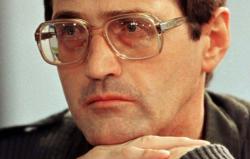
Published date
30 October 1996
During the Apartheid regime, Eugene de Kock was a colonel in the South African Police force. He acted as the commander of a counter-insurgency group located on the outskirts of Pretoria, known as Vlakplaas. De Kock commanded the C1 unit, which functioned as a para-military squad, either executing anti-apartheid activists or forcing them to end their involvement with liberation movements by torturing them. These political executions continued throughout Apartheid and intensified during the 1980s when the system began to crumble. At the advent of democracy, those involved in political murders were brought before the Truth and Reconciliation Commission (TRC). De Kock's testimonies were heard here, revealing not only his own involvement in ANC deaths, but the involvement of political leaders at the time, such as F.W. de Klerk, whom de Kock claims was responsible for ordering multiple political deaths during his term of office.De Kock was accused of many crimes, one of which was attempting to cover up the involvement of the security police in the murder of four United Democratic Front activists (UDF), known as the Cradock Four. His application for amnesty was denied and on 30 October 1996, de Kock was sentenced to 212 years in prison. The judge described him as a chilling and revolting agent for Apartheid, however, a psychologist who served on the TRC, Pumla Gobodo-Madikizela, stated that de Kock seemed to show remorse during her interviews with him.Eugene de Kock was released on parole in 2015 and has since been spotted at the Frranschoek Literary Festival, in the Western Cape. Vlakplaas, where he ordered numerous political executions to be carried out, is now used as a centre for research into the use of western and traditional medicines in South Africa.
References
Eugene de Kock blames securocrats for deaths do Cradock Four [online]. Available at: doj.gov.za [Accessed 22 October 2009]| Kalley, J.A.; Schoeman, E. & Andor, L.E. (eds) (1999). Southern African Political History: a chronology of key political events from independence to mid-1997, Westport: Greenwood.| Swarns, R. L. Looking for hope in an Apartheid Monster's Eyes. 10 May 2003. [online] Available at: racematters.org [Accessed 22 October 2009]